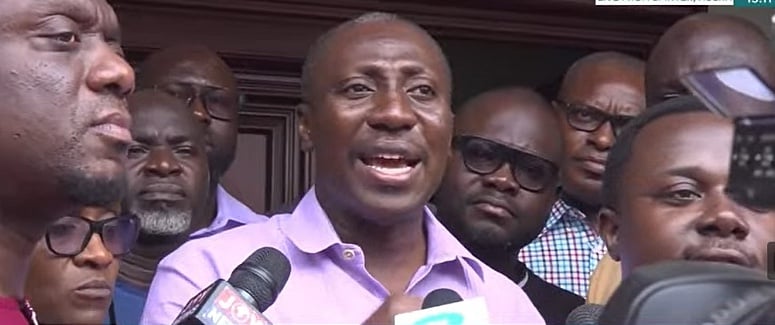The political landscape in Ghana has been roiled by a controversy stemming from allegations made by Reverend John Ntim Fordjour, a Member of Parliament representing Assin South and Ranking Member on the Defence and Interior Committee, concerning suspicious activities at Kotoka International Airport. Rev. Fordjour’s claims centered on two unannounced flights that allegedly landed at the airport under questionable circumstances, raising concerns about potential involvement in illicit activities such as drug trafficking and money laundering. These allegations quickly ignited a political firestorm, with the government vehemently denying any wrongdoing. The situation escalated dramatically when officials from the National Investigations Bureau (NIB) reportedly attempted to apprehend Rev. Fordjour at his residence in Accra, an action that the parliamentary minority has condemned as an act of political intimidation.
The attempted arrest of Rev. Fordjour has drawn sharp criticism from the Minority in Parliament, who view it as a blatant attempt to stifle legitimate parliamentary scrutiny and suppress dissent. Minority Leader Alexander Afenyo-Markin denounced the NIB’s actions, characterizing them as a direct assault on democratic principles. He argued that instead of investigating the substance of Rev. Fordjour’s allegations, the state apparatus was targeting the whistleblower, a move he deemed unacceptable in a democratic society. Afenyo-Markin reiterated the Minority’s unwavering support for Rev. Fordjour and issued a stern warning against the misuse of state security agencies to quell opposing voices.
The Minority has emphasized the importance of conducting a thorough and transparent investigation into Rev. Fordjour’s allegations, adhering strictly to due process. They argue that the government’s response, which appears to prioritize silencing the messenger rather than addressing the message, undermines the principles of accountability and transparency that are essential for a healthy democracy. Afenyo-Markin urged Ghanaians to remain vigilant and actively support efforts to uphold justice and ensure that those in positions of power are held accountable for their actions.
This incident underscores the delicate balance between national security concerns and the protection of fundamental democratic rights. Rev. Fordjour’s allegations, if substantiated, raise serious questions about the integrity of security protocols at Kotoka International Airport and the potential for its exploitation by criminal elements. However, the government’s response, perceived by many as heavy-handed and aimed at suppressing dissent, raises equally concerning questions about the state of freedom of expression and the potential for the abuse of power.
The NIB’s attempted arrest of a sitting Member of Parliament, particularly one serving on the Defence and Interior Committee, has inevitably heightened political tensions. The Minority’s strong reaction signals their determination to resist what they see as an attack on the institution of Parliament and its role in holding the government accountable. The incident also highlights the crucial role of a free press and an engaged citizenry in safeguarding democratic values.
As the controversy continues to unfold, the NIB’s silence on the matter only serves to deepen suspicions and fuel speculation. The absence of a formal statement from the Bureau regarding the alleged arrest attempt leaves many questions unanswered and contributes to the perception of a lack of transparency. The unfolding events will undoubtedly be closely scrutinized by the public, civil society organizations, and international observers, all of whom have a vested interest in ensuring that Ghana upholds its commitment to democratic principles and the rule of law. The resolution of this issue will likely have significant implications for the political climate in the country and the relationship between the government and the parliamentary opposition.














